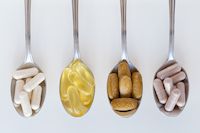Article
Impact of Dietary Interventions, Supplements on Heart Health and Mortality
Author(s):
A new study is adding to the ongoing debate of the true impact of nutritional supplements and dietary interventions on cardiovascular outcomes.

A new study is adding to the debate over the impact of nutritional supplements and dietary interventions on heart health and mortality rates. 


A review of multiple trials that contained close 1 million participants revealed that many supplements, like multivitamins and antioxidants, have no effect on outcomes and while a select few were associated with reduced risk for cardiovascular outcomes, others were found to increase a patient’s stroke risk. 


In order to evaluate the efficacy of nutritional supplements and dietary interventions in preventing mortality and cardiovascular disease, investigators conducted an extensive review that included more than 200 trials. In all, 277 randomized clinical trials, including 24 interventions, were included in the review. A total of 5 meta-analyses were performed and 992,129 participants were identified for the current study.
Investigators used PubMed, CINAHL, and the Cochrane Library from inception to March 2019 to identify trials for inclusion. Search terms used by the investigators included minerals, vitamins, diet, and cardio vascular outcomes. The main outcome for the current analyses was all-cause mortality and secondary outcomes were cardiovascular mortality, myocardial infarction (MI), stroke, and coronary heart disease (CHD). 

A total of 16 supplement types were included as interventions in the meta-analyses. They were antioxidants, B-carotene, vitamin B complex, multivitamins, selenium, vitamin A, vitamin B3 or niacin, vitamin B6, vitamin C, vitamin E, vitamin D, calcium plus vitamin D, calcium, folic acid, iron, and omega-3 LC-PUFA. The meta analyses also included 8 types of dietary interventions, including Mediterranean diet and intake of reduced saturated fat, modified dietary fat, reduced dietary fat, reduced salt among hypertensive and normotensive participations, increased omega-3 a-linolenic acid [ALA], and increased omega-6 PUFA.
After assessing all 24 interventions for the risk of all-cause mortality, investigators found that reduced salt intake in normotensive participants reduced that patient’s risk (RR, 0.90 [95% CI, 0.85 to 0.95]; P = 0.01; I2 = 0%; moderate certainty). Investigators noted that no other nutritional supplements were associated with risk for this outcome.
A total of 21 interventions assessed risk for MI among participants. Analyses revealed that use of omega-3 LC-PUFA was associated with a reduced risk (RR, 0.92 [CI, 0.85 to 0.99]; P = 0.03; I 2 = 1%; low certainty), while other supplements or interventions were not associated with risk for MI outcomes. 


As with the MI risk assessment, 21 interventions assessed the risk for stroke. Investigators found that folic acid was associated with lower risk (RR, 0.80 [CI, 0.67 to 0.96]; P = 0.02; I 2 = 0%; low certainty). Conversely, investigators noted that combined calcium pus vitamin D intake was associated with an increased risk for stroke (RR, 1.17 [CI, 1.05 to 1.30]; P = 0.01; I 2 = 0%; moderate certainty).
Lastly, 19 interventions assessed the risk for CHD. Investigators found the use omega-3 LC-PUFA was associated with reduced risk (RR, 0.93 [CI, 0.89 to 0.98]; P = 0.01; I 2 = 2%; low certainty) and they found no association between the other interventions and risk for CHD. 


In a related editorial, Amitabh Pandey, MD, and Eric Topol, MD, both of the Scripps Research Translational Institute at the Scripps Clinic in La Jolla, CA, wrote that any study that giving a clearer view on the impact of these supplements and interventions is welcome.



“There are limited data to support or refute the health claims of various diets. With this murky landscape, a study that might illuminate the field would be especially welcome,” they wrote. 

The duo continued on to say that further and more definitive research is needed before determining the true impact of such interventions. 


“Unfortunately, the current study leaves us with the same foggy conditions that we started with. Until these conditions clear, it would be reasonable to hold off on any supplement or diet modification in all guidelines and recommendations,” Pandey and Topol wrote. 

This study, titled “Effects of Nutritional Supplements and Dietary Interventions on Cardiovascular Outcomes,” is published in the Annals of Internal Medicine.


